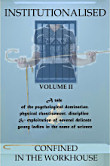The Library of Spanking Fiction: Wellred Weekly
|
||||||
|
Articles
Items of interest regarding all things spanking
|
||||||
|
|
Plausibility in Spanking Fiction (cont.)  In the past I've included all kinds of elements in stories in order to come up with a scenario of that type, which while perhaps not quite as realistic as some others, at least seems possible, although not without raising certain ethical and moral issues that I know may bother some readers. For example one of my latest stories revolving around the domestic arena involves the exploitation of the heroine's benzodiazepine (a prescription tranquilizer) dependence - engineered by a tame psychiatrist - in order to impose a regime of strict discipline backed up by spanking and the cane. And if you think the collusion of a health professional, psychiatrist, psychologist or nurse is far fetched... Well, that brings me to the wonderful world of institutional discipline and spanking. You'll notice I don't mention the term, 'scholastic', in the same breath as the word 'institutional' at any point - and there is good reason, I believe, for this. As was mentioned earlier, in any contemporary scholastic setting one might envisage existing in the Western world, any form of corporal punishment will have been outlawed by legislation, and all parties concerned will know this. Even if one were to delve into the fairly recent past - at a point when spanking and the cane were still accepted forms of correction - it is difficult to see past such done-to-death stereotypical scenarios as the spanking dealt out for smoking behind the bike shed or the caning earned for 'playing truant' and so on. Besides, it seems to me that for any spanking-related tale to be imaginative, suitably punitive and yet plausible (in that the disciplinarian should remain vouchsafed from busybody officialdom and do-gooder interference) some form of institutional residency becomes an essential part of the equation. But even the strictest residential educational institution one might realistically envisage would have woven into its routine various breaks and vacation periods - time and opportunity aplenty for any untoward or over-zealous disciplinary procedures to become public knowledge. Even if a writer should invoke some other form of institution in which various disciplinary measures might be expected to be in place to maintain order, whether judicial, such as a reformatory or prison, or even a psychiatric hospital or care home, the contemporary setting is difficult to work with - so many safeguards and guidelines in place you see, or so perhaps one might think. And yet, of the above examples, it is in the world of psychiatric institutions and of ecclesiastical charitable care homes that we find the most fertile ground for plausible and believable tales of strict discipline, petty rules and restrictions, over-the-knee spankings and liberal doses of the cane. After all, what could be more plausible than that which has actually taken place? For what has occurred in the past, history tells us, can happen again - and so often has! Right up into the 1970s we have had the so-called 'Magdalene laundries' - surely fertile ground in which to plant a tale of unrelenting exploitation, spanking and caning (as has indeed been done - for example, the film: The Magdalene Sisters, 2002 directed by Peter Mullan - but not yet to the point that the seam has become mined-out). We are long removed from the days of the Poor Law system, when a particularly fractious and refractory girl might be committed to the loving arms of the nuns of The Sisters of Mercy with the stated aim of making her 'more amenable to religious discipline' simply for having been seen flirting with one too many of the village lads - or perhaps having ill-advisedly refused the advances of some local dignitary. Nevertheless who is to say - assuming the reported longevity of the Magdalene laundries is not in question - what remnant of that system might still survive to this day behind high inscrutable stone walls somewhere? Then we have the world of the semi-legitimised experimental psychology investigation - witness the so-called 'Stanford Experiment' in which an approximation of a prison establishment was set up in a basement area of the prestigious Stanford University in the USA. The latter involved an all male protocol and was shut down after a few days having very quickly run out of control, those selected as prison guards exhibiting an ever greater tendency towards sadistic behaviour and the 'prisoners' becoming ever more resigned, even submissive. But what if it had not been shut down so promptly? What if the 'prisoners' were female (because I prefer that)? What if instead of student volunteers, members of less traceable sectors of society were to be recruited, the runaways, the type that those church-run 'laundries' and 'industrial schools' would once have branded as 'incorrigibles, at moral risk'?     The 1930s right through to the 1970s (with the 50s seemingly the heyday) seems the most fertile period for invoking the spectre of unethical psychology experiments - including, but not limited to, deliberately inducing stuttering in test subjects. But who is to say what is going on behind closed doors to this day - such scandals seem to have the knack of remaining buried until decades after the event. There is tremendous scope here. For example, take the above mentioned stuttering experiment: the protocol was based on utilizing psychological pressure to induce a verbal stumble or other speech defect and then capitalizing on it to create further pressure by drawing the subject's attention to the supposed speech defect. Would it be so difficult to imagine a residential cohort recruited from among late-teen runaways during perhaps the coldest winter in decades and legal waivers duly signed and dated. And what better way to apply psychological pressure than a wickedly pliant length of rattan hovering over an outstretched palm - and the warning given not to 'stammer over the reading of the passage this time through, girl'? Then we come to certain more contentious forms of 'treatment' reportedly prevalent in the contemporary world of psychiatric care. I am talking here of so-called 'harassment therapy'. Although it is true I have yet to come across a reliable, explicit report of corporal punishment being in use. The utilization of various forms of physical enforcement has been implied within contemporary accounts of young women being forced to clean out shower cubicles - and even toilets - on their hands and knees with toothbrushes and so on. Given such a regime, is it so far-fetched to imagine a pretty inmate draped over a nurse's knee for a hand or hairbrush spanking, her hospital examination gown peeled back either side of a delectable pair of bare drum-tight buttocks? Remember too, the ease with which it was once possible for a young wife to find herself committed on little more than the say-so of her spouse and a few pieces of silver having changed hands, perhaps to make way for an even younger, even more delectable morsel, perhaps to grant her spouse greater control over her estate... Oh the possibilities inherent in the granting of an enduring power of attorney! And then we come to the possibilities opening up through today's obsession with television 'reality' shows, many of which seem increasingly to be evolving towards the sadistic end of the spectrum in the trials and tribulations they put their contestants through. But then again, perhaps we shouldn't overlook reality itself, not when taking into consideration the ever-worsening economic situation in the West, the increasing gap between rich and poor and the dearth of employment opportunities. In such an economic climate with an excess workforce chasing fewer and fewer unskilled positions - coupled with a growing housing crisis - might we not be facing a situation wherein once again the price of labour becomes cheap enough for live-in domestic service to become a more common form of employment for a young school-leaver to find herself in. With the very roof over her head directly tied to her continued employment, wages amounting to little more than 'room and board' (the minimum legal wage is easily dealt with by offsetting against room rental coupled with inventively-levied financial penalties for poor performance) and no hope of further employment without glowing references, it would not be that difficult to imagine a few strokes of the cane or a few minutes spent over the lap of the mistress of the house being preferable to severance. Having dealt with the setting and the impetus for the imposition of a regime incorporating corporal punishment, we come to the ending of the tale. I do sometimes feel I should apologise for not providing any form of 'happy ending'. But happy endings are hard to come by in story telling where the action by definition would lead to the prosecution of the protagonists should the story leak out. That in itself, for some, would constitute a happy ending - the victim set free, her tormentors left behind bars. But is that what non-consensual story telling is all about? Given the high stakes, surely the perpetrators would go to great lengths to cover their tracks and ensure the secret of their actions remains safe. But for all time? How? I for one would not like to go down the fatal route taken by certain other writers of the genre. And for sake of plausibility, given a contemporary or near-contemporary Western world setting, the 'she was sold into slavery to an oil-rich sheikh and was never seen or heard from again' is out of the question. And yet many of those that disappeared into the depths of the Church-run 'industrial school' system were never seen or heard from again, outside of the convent walls - and one does not have to go too far back in history to invoke the existence of such an institution. Some say the last didn't perish until the early 1970s! Who's to say what might still survive of that system in some remote location. Then there are the welcoming arms of the mental health system - it was easier to be embraced within their tenacious protection in the 1960s (and easier still to arrange in even earlier times). Personally, I'd rather come across the hanging, open ending - a glimmer of hope for our hapless, browbeaten and put-upon heroine hanging somewhere out in the distance, but for now, the prospect of perhaps being placed into service under the stiletto heel of her domineering guardian, or cane-wielding, gold-digging young step-mother, made a servant in her own home. Or if ensconced in some institution, perhaps she is about to face some sort of review panel, visiting board of governors or government authority inspector with the prospect of putting her case and turning the tables, of bringing the full might of the law into her corner - but all the time, behind the scenes... Well, you get the idea!  13 comments
|
|||||
| Pages: 1 2 3 4 5 6 7 8 9 10 11 12 13 14 15 16 | ||||||


